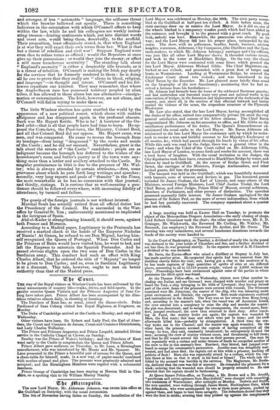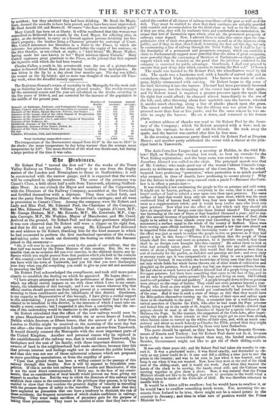'itbe _Metropolis.
The new Lord Mayor, Mr. Alderman Johnson, was sworn into office at the Guildhall on Saturday, with the usual ceremonies. The 9th of November having fallen on Sunday, the installation of the Lord Mayor was celebrated on Monday, the 10th. The civic party assem- bled at the Guildhall at half-past ten o'clock. A little before noon, the state carriage drew up to receive the Lord Mayor. As it did so, one of the wheels hitched in a temporary wooden porch which had been added to the entrance, and brought it to the ground with a great crash. By good luck, nobody was hurt. Meanwhile, the procession was already on its way; and the Lord Mayor fell into his proper place, unimpeded by the omen. The show, with its policemen, beadles, bands, banners, ancient knights, Avatermen, Aldermen, City Companies, (the Distillers and the Spec- tacle-makers, to which Mr. Johnson belongs,) carriages and City-officers, was just like all other Lord Mayors' shows. It threaded various streets, and took to the water at Blackfriars Bridge. On the way, the cheers for the Lord Mayor were contrasted with some hisses which greeted the late Lord Mayor, Alderman Michael Gibbs. The Chief Magistrate em- barked at one o'clock, and proceeded, with a great fleet of barges and boats, to Westminster. Landing at Westminster Bridge, he entered the Exchequer Court about two o'clock; and was introduced to the Chief Baron by the Recorder. Mr. Law glanced more briefly than usual on the biography of the new functionary; mentioning that he had re- ceived a fortune from his forefathers—
Mr. Johnson had formerly been the lessee of the celebrated Dartmoor quarries; and had undertaken and executed many very great and national works in the construction of bridges, in the formation and improvement of the dockyards of the country, and, above all, in the erection of that effectual bulwark and barrier against the violence of the ocean, the stupendous structure of the Plymouth Breakwater.
Mr. Law also stated, that the late Lord Mayor, having accomplished all the duties of his office, retired into comparatively private life amid the very general satisfaction and esteem of his fellow citizens. The Chief Baron congratulated Mr. Johnson on his accession to office, and Mr. Gibbs on the satisfactory performance of his duties. The Queen's Remembrancer ad- ministered the usual oaths to the Lord Mayor. Mr. Baron Alderson ad. ministered to the late Lord Mayor the customary oath by which he under- took to render a true and faithful account to her Majesty's Exchequer of all monies, &c., which had passed through his hands by virtue of his office. While this oath was read by the Judge, there was a general titter in the Court; and when the Usher of the Court called on Mr. Alderman Gibbs, late Lord Mayor of London, to come forth and render his account, there was a loud burst of laughter. With the usual invitation to the Judges, the City dignitaries took their leave, returned to Blackfriars Bridge by water, and thence by land to Guildhall. At the corner of Bridge Street and Fleet Street, the carriages of the Ministers, Foreign Ambassadors, and other invited guests, fell into the procession.
The banquet was held in the Guildhall; which was beautifully decorated with banners, suits of armour, and devices in gas. The honoured guests included Sir James Graham, the Earl of Lincoln, and some others of the Ministers, several Foreign Ministers, Lord Chief Justice Tindal, the Lord Chief Baron, and other Judges, Prince Hilal of Muscat, several noblemen, Members of Parliament, and other persons of distinction. The speeches possessed unusually little interest. Sir James Graham apologized for the absence of Sir Robert Peel, on the score of severe indisposition, from which he had but partially recovered. The company separated about a quarter past ten o'clock.
A large meeting was held at Exeter Hall on Tuesday, to promote -the object of the Metropolitan Drapers Association—the early closing of shops. Lord Robert Grosvenor took the chair; the other speakers were, Mr. R. D. Grainger, Mr. Winkworth, the Reverend Mr. Curling, Mr. Wakley, Mr. Bennock, (an employer,) the Reverend Dr. Archer, and Mr. Owen. The meeting was very unanimous, and several handsome donations towards the funds of the society were handed in.
In the Court of Bankruptcy, on Tuesday, a dividend of nearly 10s. in the pound was declared in the joint estate of Chambers and Son, and a farther dividend of not less than 9s. was promised shortly. In the separate estate of A. H. Chambers a dividend of fer. was declared.
Mr. Davis, the Excise-officer who seized a distillery at Stepney in July last, has made another prize. He suspected that spirits had been removed from the distillery shortly before his visit; and, having got a clue to the receivers of it, he has made captures of large quantities of spirits of nitre at six different places, amounting in all to 12,519 pounds weight, valued at 2,0001. without the duty. Proceedings have been commenced against some of the parties in whose possession the illicit spirit was found.
At the Thames Police-office, on Wednesday, sixteen men (that number in- cluding one Italian and one German) were charged with murder and piracy on board the Tory, a ship belonging to Mr. Gibb of Liverpool; they having formed part of the crew. Some of the prisoners were covered with wounds. The witnesses examined were Mr. Johnstone, the master of the ship, who was labouring under great excitement, and Sinclair, the carpenter. Both made statements confused and contradictory in the details. The Tory was on her return from Hong-kong; and, according to the master's tale, when the vessel was off Ascension Island, the crew entered into a conspiracy to seize the ship and murder the master: the plot was discovered; and to escape the consequences, the second-mate, Ram- bert, jumped overboard; the crew then returned to their duty. After touch- ing at Fayal, the mutiny broke out again; the captain was wounded by Mars, the first mate; this man and others were put in irons; and the crew afterwards killed him—probably by strangulation. A third time the mu- tiny broke out in the Channel, and the master was again wounded. On the other hand, the prisoners accused the captain of having committed all the wrong: he was, they said, constantly intoxicated; he outrageously ill-used the men; accusing the crew of mutiny without cause, and threatening to kill them; and that he did wound several the traces on their persons proved. One man he cut repeatedly with a cutlass and under threats of death be compelled another of the crew to fire in this seaman's face. Rambert, they hinted, had jumped over board to escape his commander's persecution. Another man was dreadfully mal- treated, and had since died. the captain cut at him while a prisoner, hacking off gobbets of flesh Mars also was repeatedly struck by a cutlass, which the cap- tain threw at him so that it stuck in his head or breast! The whole tale un- folded by the accused was horrible in the extreme. The Magistrate, Mr. Brode- rip, declared that the case was full of mystery. He remanded the prisoners for a week; ordering that the wounded men should be properly attended to He also directed that the captain should be forthcoming. At Queen Square Police-office, on Tuesday, a Mr. Brown and a Mr. Arnold, "gentlemen and cotton-spinners from Macclesfield," were charged with assaulting two tradesmen of Westminster, after midnight on Monday. Godwin and Smith, the men assailed, were walking through James Street, Buckingham Gate, when the defendants, who were accompanied by two or three more persons, pushed up against them, and began to beat them savagely. The defendants denied that they were the first to strike; averring that they pushed up against the complainapta by accident; but they admitted they had been drinking. Mr. Bond, the Magis- trate, deemed the assaults to have been proved, and to have been most unprovoked. Re fined Arnold 10f. and Brown Si. Of course "the fines were immediately paid." Mary Cattell has been set at liberty. It will be recollected that this woman was committed to Bridewell for a month, by the Lord Mayor, for soliciting alms, in order, as she declared, to carry on a lawsuit against persons detaining her bro- ther's property; the brother being a Chancery prisoner for contempt of Court. Mrs. Cattell announces her liberation in a letter to the Times, in which she reiterate, her grievances. She was released before the expiry of her sentence, on the 31st October, at ten o'clock at night; a " kind friend," Mr. Henry Walker, having made her case known to her " Royal mistress Queen Victoria." Mary Cattell expresses great gratitude to the Times, as the journal that first exposed the injustice with which she had been treated.
Charles Callen, a youth in his seventeenth year, the son of a picture-frame maker in Goswell Street Road, died on Sunday morning from hydrophobia. He was bitten in the lip by a dog about four months ago. The dog was killed; the wound on the lip healed; and no more was thought of the matter till Tues- day week, when the dreadful malady appeared.
The Registrar-General's return of mortality in the Metropolis for the week end- ing on Saturday last shows the following general results. The weekly averages for the autumnal season and the year are calculated on the deaths occurring in the five years of 1840-4, and are corrected for the increase of the population to the middle of the present year.
Number of deaths. Autumnal avenge. Annual average.
Zymotic (or Epidemic, Endemic, and Contagious) Diseases 212 ... 201 ... 184
Dropsy, Cancer,and other diseases of uncertain or variable seat
89 ... 109 ...
106
Diseases of the Brain. Spinal Marrow, Nerves, and Senses 139 ... 135 ... 159 Diseases of the Lungs, and of the other Organs of Respiration 313 ... 323 ... 293 Diseases of the Heart and Blood-vessels 22 . . 24 Diseases of the Stomach, Liver, and other Organs of Digestion 83
Diseases of the Kidneys, &e 4
Childbirth, diseases of the Uterus, &c 16
Rheumatism, diseases of the Bones. Joints, &c. 7
Diseases of the Skin, Cellular Tissue, &e.
Old Age
violence, Privation, Oold, and Intemperance
33 ... 74 ... 70 Total (Including unspecified causes) 914 ... 1,020 ... 963
The temperature of the thermometer ranged from 65.9° in the sun to 33.0° in the shade; the mean temperature by day being warmer than the average mean temperature by 2.0°. The mean direction of the wind was South-east, but during a large portion of the time it was calm.



























 Previous page
Previous page